RESPECT FOR HUMAN RIGHTS, EQUAL OPPORTUNITIES AND STAFF ENGAGEMENT

Building a comfortable, fair, and encouraging work environment is an overriding priority of Moscow Exchange Group. Over the past several years, Moscow Exchange has put considerable efforts into building a culture of respect and trust in the workplace and increasing employee satisfaction and engagement. Today, the Group continues to take part in dynamic activities to that end.
Care for our employees has been a key focus area of Moscow Exchange throughout 2023, which is reflected in the Sustainability Roadmap. Priority areas include pursuing equal opportunities for men and women, encouraging a healthy work-life balance, increasing the flexibility of the working environment, and ensuring the physical and emotional well-being of staff. The Group’s management seeks new approaches to developing expertise, managing the agenda, and setting ambitious and quantifiable objectives.
- SDG 4.4 Develop employees’ professional and technical skills
- SDG 4.7 Train employees to effectively manage sustainability within the Group
- SDG 5.5 Ensure gender equality in the Group
- SDG 8.5, 8.6, 8.7, 8.8 Ensure decent working conditions for employees
2023 Highlights
This subsection provides a description of the activities and initiatives of the Moscow Exchange Group to create decent working conditions, a safe and comfortable workplace environment, and the basic principles that ensure a culture of development and equal opportunities. Particular attention is paid to the Group’s efforts to train and develop employees, including raising employee awareness of sustainability issues.
For 2021, 2022, 2023 metrics, see the “Respect for human rights, equal opportunities and staff engagement” subsection of the “Sustainability Data” section. For key policies, procedures, and departments, see the relevant subsection of the “Sustainability Approaches and Procedures” section.
2-7
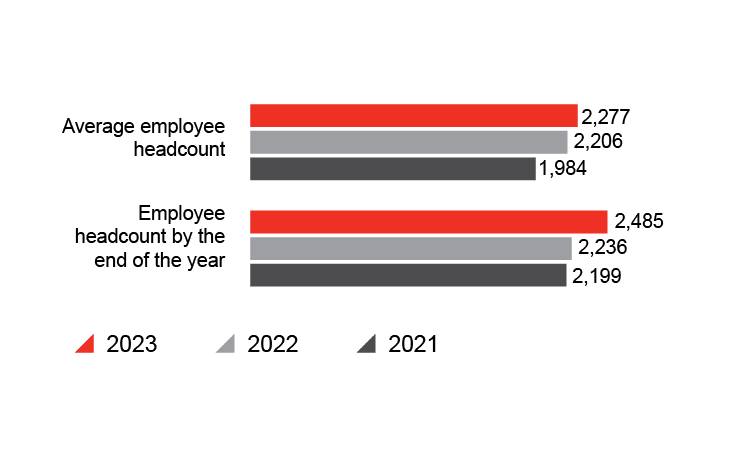
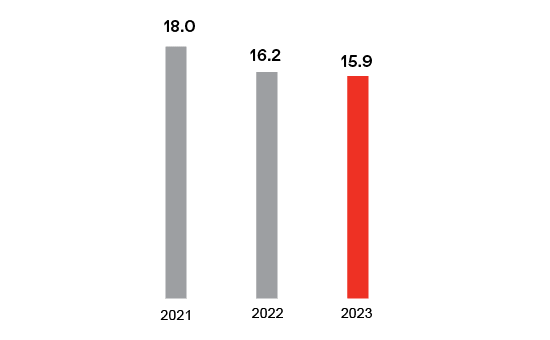
401-1
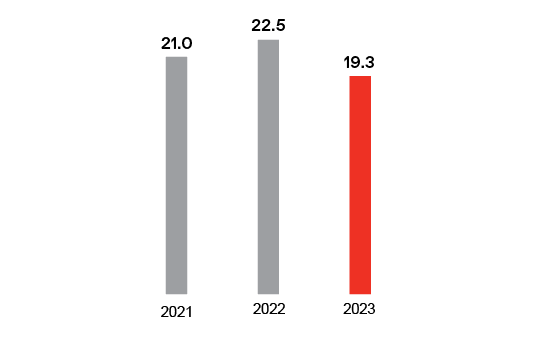
In 2023, Moscow Exchange Group introduced an electronic document management (EDMS) for human resources. 2023 also saw the start of the implementation of the project of common accounting system for personnel and payroll as part of the optimization of HR processes. The project is scheduled to be completed in 2024.
Staff engagement and performance
The total employee headcount of the Moscow Exchange Group increased by 11.1% in 2023. The staff turnover rate was 15.9%, a decrease of 0.3 p.p. compared to 2022. The rate remains significantly lower than the average turnover rate for the financial sector in Moscow (based on data for 2021-2022). There have been no job cuts within the Group over the past three years.
By analysing the reasons for employee resignations, the Group takes measures to reduce turnover on this basis. To this end, employee engagement is monitored. In 2023, the Supervisory Board of the Exchange approved a new long-term incentive programme for 2023-2028 to retain key personnel and ensure their focus on the long-term business development of the entire Group. The Group is also implementing a long-term incentive programme for key personnel based on phantom shares.
Every year, the Group conducts a comprehensive study of employee engagement. In 2023, 80% of the staff took part in the study. Polling yielded the following results:
engagement – 87.8 %;loyalty – 86.7 %;satisfaction – 87.0 %.
Key areas of development were identified through the survey. In order to create a plan to enhance the efficiency of operations, the Group organised focus groups, identifying critical areas for employees, such as HR issues, career planning, training, remuneration, and work-life balance. Relevant activities and discussions were subsequently arranged.
Learning and development
404-2
The company’s approach to employee professional development is implemented across three pillars:
- Flexibility and accessibility of training
Training planning, driven by learning needs that are identified every quarter, allows the educational programmes to be tailored to the specific needs and professional interests of employees, thus contributing to their personal and career development. The decision to train an employee is prioritised on the need for new skills for the strategy implementation and tactical objectives rather than the cost of training, thereby ensuring a high accessibility and the opportunity for comprehensive development of skills and competences.
- Compliance with the company’s strategy
Training programmes are based on the employee’s profile, assessment of competencies required to achieve the company’s goals, implement innovative projects, and to improve process efficiency. Employees benefit from an environment that helps them apply the knowledge gained during training in practice, learn from fellow experts, and develop in the employment setting.
- Adaptivity
Through ongoing collection of feedback from employees post-training, the pool of training providers and educational courses can be tailored and improved, leading to greater relevance and effectiveness.
Investing in our employees is a fundamental aspect of the Exchange’s sustainability strategy. In 2023, 980 Group employees received various training. 255 employees received advanced training and appropriate certificates.
Diversity and equal opportunity
405-1
Gender structure of the Group’s employees by levels is shown below. More details on this information is located in the “ Sustainability Data “ section.
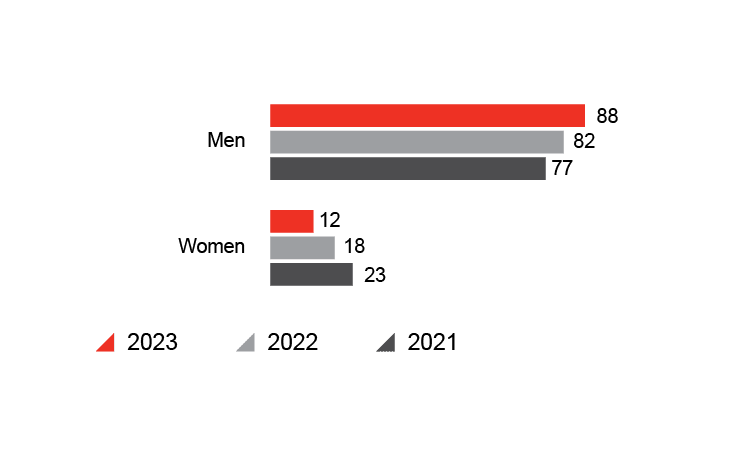
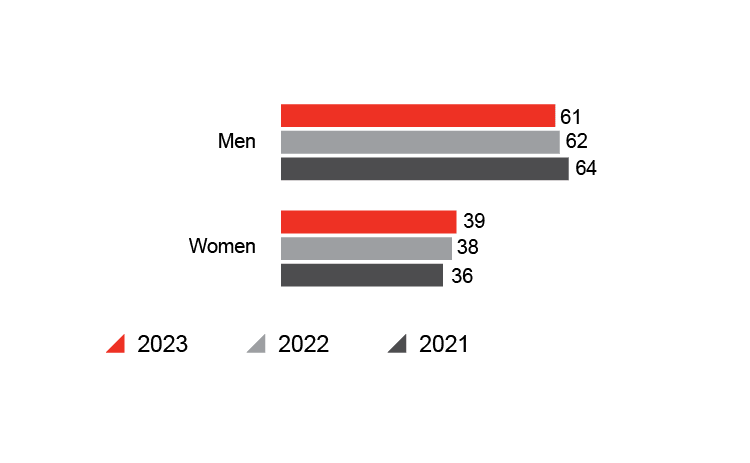
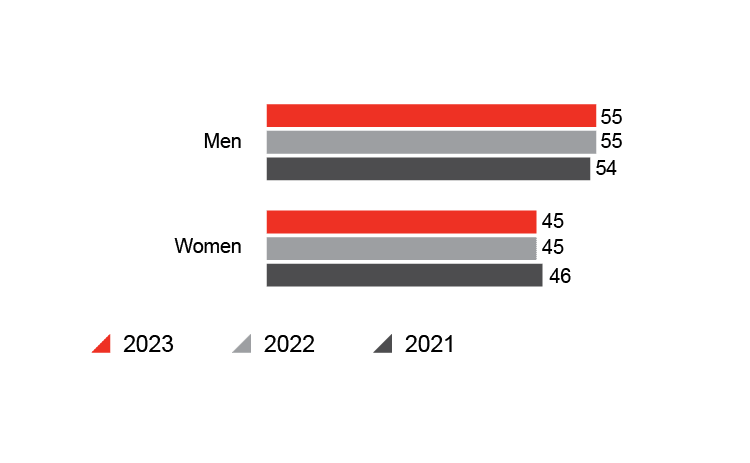
Moscow Exchange Group focuses on the social and cultural diversity of its employees, providing them with equal opportunities in terms of training, career development, and social benefits. This approach leads to a more productive and comfortable work environment.
The Group follows the recommendations of the Central Bank of Russia in forming and maintaining the continuity of the Supervisory Board; including based on the principle of equal opportunities for men and women.
In terms of the percentage of women among the workforce, the Group adheres to global best practices. Despite some challenges, particularly the fact that there are far fewer women in the Russian IT sector than men, the Group takes active steps to hire women in its IT departments.
202-1
Moscow Exchange Group provides its employees with a competitive level of remuneration. In 2023, the average salary of specialists and workers of the first grade, including bonuses, was 4.5 times higher than the minimum wage set in Moscow as of 1 January 2023.
On 26 January 2023, a Memorandum on corporate social responsibility was approved, declaring respect for human rights, gender equality and socio-cultural diversity, and condemning all forms of physical violence, verbal abuse and sexual harassment.
In 2023, the second survey of Group employees on gender equality was conducted to identify priority policy areas for promoting equal opportunities for men and women at the Moscow Exchange Group. Similar surveys are planned to be conducted on a regular basis.
During the reporting period, a Moscow Exchange working group on gender equality held two meetings to discuss the Moscow Exchange’s current position in terms of gender aspects of operations, including in comparison with foreign exchanges, proposals on improving HR policies with respect to respecting women’s rights and supporting maternity and paternity.
In 2023, the second phase of the programme of additional social benefits and compensation for employees selected as key experts of the units was launched. The composition of key experts was updated, some of whom were transferred to the second level of the Program. In 2024, it is planned to transfer some experts to the third (highest) level of the Program.
Occupational health, security protection, safety and well-being
403-3 403-6
Under certain conditions, employees are offered such opportunities as working from home or flexible working hours. In accordance with the Labour Code of the Russian Federation and at the request of the employee, the employer may establish part-time work for pregnant women, for a parent (guardian, custodian) with a child under the age of 14 or a disabled child under the age of 18, and for employees caring for a sick family member. Women and men (at the choice of the family) are given parental leave to care for a child up to three years of age; mothers who start work early are given breaks to feed their child up to one and a half years of age; and additional four days off per month with pay to care for a child with a disability.
Although working conditions at Moscow Exchange Group are not associated with high risks of injury and occupational disease, the Group invests in maintaining a safe working environment and maintaining the health and well-being of its employees.
403-2 403-9 403-10
In 2023, Moscow Exchange Group did not record any cases with staff members or contractors performing work at the Group’s facilities that can be classified as micro-injuries or occupational accidents which, in accordance with the legislative requirements of the Russian Federation, are subject to recording and investigation.
The cases of employees applying for voluntary health insurance, including to corporate doctors, relate to personal health conditions of employees that are not related to the company’s operations.
In 2023, more than 10 local regulations on labor protection were approved for each group company, including the Regulations on the investigation and recording of industrial accidents, the Regulations on the procedure for considering and recording microdamages (microtraumas) of workers and others
Every year, the Moscow Exchange Group approves an action plan to improve labor conditions and safety for the current year. The main activities being implemented are: organizing and conducting mandatory training on labor protection for company employees; organizing and conducting mandatory briefings on labor protection (introductory, at the workplace); organisation and conduct of mandatory medical examinations (preliminary, periodic, pre-trip), psychiatric examinations for workers of certain categories and professions; conducting a special assessment of working conditions and assessment of professional risks at the workplace of company employees; provision of personal protective equipment (PPE) to certain categories of workers, as well as first aid kits for providing first aid to victims.
Plans for 2024
Moscow Exchange will continue to work to maintain decent working conditions for its employees. At the same time, given the challenging foreign policy environment, the Group does not rule out the possibility of adjusting plans, including those included in the Sustainability Roadmap. Nevertheless, Group companies will continue to develop key initiatives planned for 2024 and beyond, adapting them to the new environment. Sustainability projects that are already underway are likely to continue. The Group’s management will do its utmost to preserve jobs and the social programmes most important to employees.
As part of the Sustainability Roadmap, the Group has planned the following initiatives and activities:
- continuing the implementation of the working time mobility programme;
- conducting an analysis of the emotional health problems of employees and possible solutions;
- carrying out a human rights risk assessment.
The key areas of activity in the area of HR management for 2023 are:
- development of corporate culture, including the adoption and integration of new corporate values;
- support for the development and diversification of the Group’s
business – providing new business areas with labor resources, motivation for short-term and long-term business results; - automation of HR processes, as part of the development of the competence center in the field of personnel management created in 2023;
- development of a system for setting goals based on KPIs and implementing OKRs (goals are key results);
- introduction of new technologies and training methods, expanding the range of training programs, strengthening the connection between training and career growth of employees.
The Exchange will also continue to familiarise its employees with the sustainability agenda and help them develop their knowledge and skills in this area.
